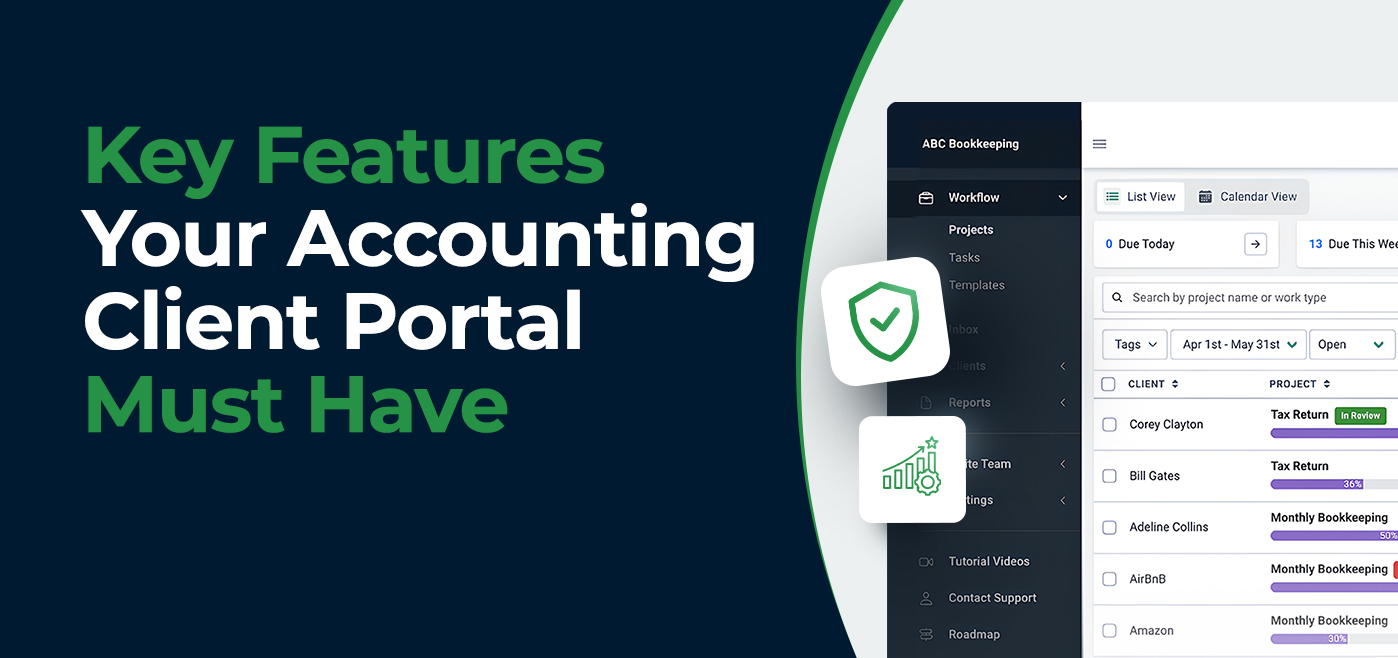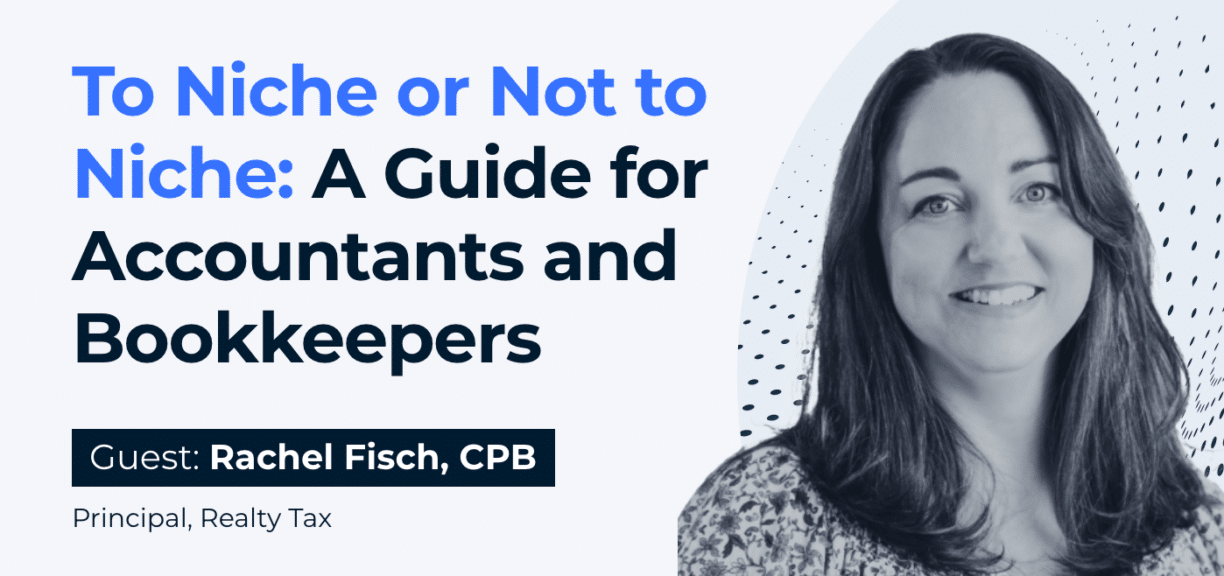To Niche or Not to Niche: A Guide for Accountants and Bookkeepers
Guest: Rachel Fisch
In this article
For accounting and bookkeeping professionals, niching down can be a strategic move, potentially unlocking new avenues for growth and specialization.
However, navigating the intricate world of the accounting industry can also feel like steering a ship through foggy waters.
You’re equipped with skills, knowledge, and a passion for numbers, and even though the concept of niching will never go out of style, there’s a lingering question that can make even the most seasoned accountant or bookkeeper pause: Should I niche down or not?
Understanding Niching in Accounting
Niching in the context of accounting refers to specializing in a specific sector or type of service. This could mean focusing on industries like tech startups, non-profits, or even specific services like forensic accounting or tax planning for high-net-worth individuals. Such specialization can lead to profound expertise and a unique market position.
You can also watch the video below to get more insights as shared by Rachel Fisch, CPB (Principal, Realty Tax)
The Pros of Niching Down
1. Enhanced Expertise
By choosing a niche, you have the opportunity to become a true expert in that area. This in-depth knowledge can set you apart from competitors and position you as the go-to professional for clients within your chosen niche.
For example, if you specialize in tax planning for e-commerce businesses, you’ll know the ins and outs of tax laws and deductions that specifically apply to this industry.
2. Targeted Marketing
Niching enables you to tailor your marketing efforts to a highly specific accounting & bookkeeping audience. You can create content, advertisements, and messages that resonate with the unique challenges and needs of your niche clients.
This targeted approach is often more effective than trying to appeal to a broad, diverse audience.
Having elements of an ideal profile would help identify your client, state out what you want your clients to have or possess, anyone that has these elements is your ideal client"
Rachel Fisch, CPB, Principal, Realty Tax3. Reduced Competition
When you narrow your focus, you’re likely to face less competition in your chosen niche. This can make it easier to stand out and attract clients who are seeking specialized expertise. Instead of competing with countless generalists, you’re competing with a smaller pool of specialists.
4. Higher Fees
Specialists often command higher fees than generalists because clients are willing to pay a premium for expertise. If you become known as the go-to accountant for a specific industry or service, you can justify charging higher rates for your specialized knowledge.
5. Stronger Client Relationships
Working within a niche allows you to build deeper and more meaningful relationships with your clients. You understand their industry-specific challenges and can offer tailored solutions. This leads to increased client loyalty and long-term partnerships.
The Cons of Niching Down
1. Limited Client Pool
One of the biggest drawbacks of niching is the potential limitation of your client pool. If your niche is very narrow, you might struggle to find enough clients to sustain your practice.
For example, if you specialize in a highly specialized area like forensic accounting for rare art dealers, your potential client base may be quite small.
Learn to channel your energy into high-quality producing clients who understand what their KPIs are. This helps you give high level of value in return"
Rachel Fisch, CPB, Principal, Realty Tax2. Market Volatility
Specializing in a niche can make your practice susceptible to changes in that niche’s market conditions. If the industry you’ve chosen experiences a downturn or faces regulatory changes, it could have a significant impact on your business.
Diversifying your services or client base can provide some protection against these fluctuations.
3. Initial Learning Curve
Becoming an expert in a niche often requires a significant investment of time and effort to acquire specialized knowledge. You’ll need to stay up-to-date with industry trends, regulations, and best practices.
This initial learning curve can be steep.
4. Risk of Over-Specialization
While specialization can be a competitive advantage, there’s a risk of becoming too specialized. If your niche becomes obsolete or less relevant, you may struggle to pivot and adapt. It’s essential to strike a balance between specialization and maintaining a broad understanding of your field.
Accounting Niches: Analyzing the Need to Niche
Before diving into a niche, it’s crucial to analyze whether it aligns with your skills, interests, and the market demand. Here’s a step-by-step guide to help you through this process:
Step 1: Self-Assessment
Start by asking yourself:
- What aspects of accounting do I enjoy the most?
- What unique skills or knowledge do I possess?
- Is there a particular industry or type of client I’m passionate about?
Step 2: Market Research
After identifying potential niches, research their market viability:
- Is there a demand for specialized accounting services in this niche?
- What is the competition like?
- Are there any emerging trends or regulatory changes in this niche?
Hiring a client care specialist also improves your client base, instead of you judging your clients based on the qualities you want, your client care specialist would see through them"
Rachel Fisch, CPB, Principal, Realty TaxStep 3: Analyze Your Current Client Base
Look at your current clients:
- Are there any common industries or needs?
- Have you received positive feedback in specific areas?
- Can your current client base support your transition into a niche?
What kind of people are your clients? What are their personalities? Having a good rigid client base would help seeing through clients with the same potential. Take a look at your existing client base"
Rachel Fisch, CPB, Principal, Realty TaxStep 4: Risk Assessment
Consider the risks:
- How volatile is the niche?
- What are the long-term prospects?
- Do you have a backup plan if the niche doesn’t work out?
Accounting Niches: Niching Strategies for Accountants and Bookkeepers
Industry Specialization: Going Beyond the Basics
While specializing in industries like healthcare or real estate is common, consider exploring less obvious sectors.
Emerging markets, such as green energy or digital currencies, can offer unique opportunities. Understanding the nuances of these industries, from regulatory landscapes to financial challenges, can set you apart.
Service Specialization: Mastering a Niche Service
Besides common services like tax planning, think about niche areas like international tax law, estate planning, or non-profit accounting.
Becoming an expert in a specialized service not only increases your value to clients but also allows for higher billing rates due to your specialized skill set.
Client Demographics: A Personal Touch
Targeting client demographics requires understanding their unique needs. For example, if focusing on startups, be well-versed in venture capital, funding rounds, and startup tax incentives.
Catering to specific demographics like retirees might involve expertise in retirement funds and estate planning.
Technological Specialization
Embrace technology niches. Become an expert in accounting software tailored to specific industries or develop a deep understanding of automation and AI in accounting.
This not only modernizes your practice but also attracts clients looking for cutting-edge solutions.
Geographical Specialization
Consider specializing in accounting practices and regulations specific to a certain region or country. This is particularly valuable in areas with complex or unique financial laws.
Implementing Your Niching Strategy
Moving from a generalist to a specialist requires a structured approach. Let’s break down the implementation process:
1. Education and Certification: Deep Dives
Beyond basic certifications, pursue advanced courses in your niche. For instance, if you’re specializing in non-profit accounting, look for courses that delve into grant management or fundraising accounting.
2. Marketing and Branding: Sharpening Your Image
Your marketing should speak directly to your niche audience. Develop case studies, blogs, and webinars that address specific issues your niche faces. For instance, if your niche is in technology startups, create content around tech innovations in accounting or financial management for tech companies.
You may be interested in:
Marketing for Accountants: How to Generate Consistent High Quality Leads for your Firm
3. Networking and Partnerships: Building a Niche Network
Forge connections with other professionals who serve your niche.
For example, if you specialize in real estate accounting, network with real estate agents and mortgage brokers. Attend industry-specific events and consider joining or forming referral groups.
4. Adjusting Your Services: Tailored Solutions
Your services should evolve to meet the precise needs of your niche. If you’re targeting small businesses, for instance, you might offer bundled services that combine bookkeeping, tax planning, and financial advisory services.
5. Technology Utilization
Leverage technology that resonates with your niche. For example, if you’re focusing on e-commerce businesses, be proficient in e-commerce accounting platforms.
6. Feedback and Adaptation
Regularly seek feedback from your niche clients and adapt your services accordingly. Stay informed about the latest developments in your niche to continuously refine your expertise and offerings.
7. Thought Leadership
Establish yourself as a thought leader in your niche. Write articles, speak at industry events, and participate in online forums. This not only enhances your reputation but also keeps you engaged with the latest trends and needs of your niche market.
Final Thoughts
When positioning yourself as the best firm for clients within your niche, focus on speaking their language to prove why you’re a good fit for each other. When you can speak the language of your niche, you’re communicating to clients and prospective clients that you “get them.” As a result, they’ll be more likely to work with you over other providers in the market.
Use Financial Cents Accounting CRM Software to Effectively Manage Clients
If you want to serve clients in your niche better, use Financial Cents’ accounting CRM software.
With Financial Cents, you can stay on top of tasks, hit your deadlines, and seamlessly communicate with clients and staff — all in one convenient dashboard.
Subscribe to Newsletter
We're talking high-value articles, expert interviews, actionable guides, and events.

Key Features Your Accounting Client Portal Must Have
By utilizing a client portal, you can eliminate the inefficiencies of manual methods and create a smoother workflow for both you and…
May 15, 2024

The 5 Best Avii Workspace Alternatives for Modern Firms
If, for whatever reason, Avii does not meet your long-term workflow needs, this review of the best Avii workspace alternatives should help…
May 08, 2024
